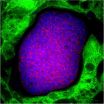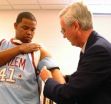(Press-News.org) This press release is available in Portuguese.
ANN ARBOR, Mich. — Two different genetic mutations cooperate to induce adrenal cancer, according to a new study from researchers at the University of Michigan Comprehensive Cancer Center and University of Sao Paulo in Brazil.
The finding provides new clues to this rare and deadly cancer type, and researchers hope it will lead to better treatments by targeting both mutations.
About 600 Americans are diagnosed with adrenal cancer per year. It is typically diagnosed in late stages when there is nearly no chance of survival beyond five years.
"Because adrenal cancer is so rare, it has been challenging to find enough patients who can provide tissue samples for research. Only through collaboration can we do this," says senior study author Gary Hammer, M.D., Ph.D., the Millie Schembechler Professor of Adrenal Cancer at the University of Michigan Comprehensive Cancer Center.
The partnership between U-M and Sao Paulo has allowed researchers to collect tissue samples from 118 people with benign or cancerous adrenal tumors.
"Our goal is to understand these tumors and the genes that are critical lynchpins so that we can develop treatments that extend patients' lives," Hammer says.
By studying both benign and cancerous adrenal tissue samples, the researchers found aberrations in two genetic pathways: beta-catenin and insulin-like growth factor 2, or IGF-2. The benign tumors had a high percentage of mutations in beta-catenin, but IGF2 up-regulation was rare. On the other hand, most of the adrenal cancers exhibited IGF-2 up-regulation. Cancers that also had beta-catenin mutation were associated with high-grade disease and worse survival, compared to tumors with only IGF-2 up-regulation.
The researchers additionally tested this finding experimentally by inducing individual or combined mutations in beta-catenin and IGF-2 in the mouse adrenal. The mice developed cancer only when both mutations were present.
Results of the study appear in the September issue of the American Journal of Pathology.
The next step is to develop treatments that block both beta-catenin and IGF2.
"It's more complex than just finding genes that cause cancer. Early results targeting IGF2 alone, while promising, don't look as robust as we had initially hoped. That could be because we need to attack both IGF2 and beta-catenin. As cancer treatments move more toward targeted genetic approaches, it's likely that these therapies will need to be used in combination," Hammer says.
Additional authors: Joanne H. Heaton, Michelle A. Wood, Alex C. Kim, Ferdous M. Barlaskar, Rork Kuick, Derek P. Simon, Elisabeth Starnes, Dafydd G. Thomas and Thomas J. Giordano from U-M; Lorena O. Lima, Madson Q. Almeida, Maria C.B.V. Fragoso, Antonio M. Lerario, Ibere C. Soares, and Ana C. Latronico, from Sao Paulo University, Brazil
Funding: U-M Millie Schembechler Adrenal Cancer Research Fund; National Institutes of Health grants DK 062027, CA 134606, T32 DK07245, T32 HD007505, T32 CA009676; National Council for Scientific and Technological Development of Brazil; Coordination for Improvement of Higher Education, Brazil
Disclosure: None
Reference: American Journal of Pathology, Vol. 181, No. 3, September 2012
Resources:
U-M Cancer AnswerLine, 800-865-1125
U-M Comprehensive Cancer Center, www.mcancer.org
Clinical trials at U-M, www.UMClinicalStudies.org/cancer
Researchers find 2 gene mutations drive adrenal cancer
International collaboration reveals clues to rare, deadly cancer
2012-09-11
ELSE PRESS RELEASES FROM THIS DATE:
CWRU nurse researchers find effort takes its toll on unpaid family caregivers
2012-09-11
According to AARP, the annual cost of unpaid elder caregiving – work that falls mainly on the backs of family members – runs about $450 billion.
While some companies document the physical and emotional toll that the workplace takes on their employees, exactly how draining caregiving might be has never really been measured.
So Case Western Reserve University nurse researchers studied it.
"Without knowing the impact of effort, we have two vulnerable people at risk for health issues—the caregiver and the care receiver," said Evanne Juratovac, assistant professor at ...
'Civilian cyber-warriors' not driven by patriotism
2012-09-11
EAST LANSING, Mich. -- People who commit cyber-attacks against the government also tend to download music illegally and participate in physical protests. Surprisingly, however, they don't appear to be acting out of some sense of national pride or patriotism.
Those are some of the findings to emerge from a Michigan State University study that for the first time begins to paint a profile of "civilian cyber-warriors," or people who engage in attacks against domestic or foreign governments. Cybercrimes pose a huge societal risk and have become a hot issue globally, yet little ...
Study ties forest 'greenness' in western US to snowpack extent
2012-09-11
Results of a new study tie forest "greenness" in the western United States to fluctuating year-to-year snowpack extent.
The results show that mid-elevation mountain ecosystems are the most sensitive to rising temperatures and to changes in precipitation and snowmelt.
University of Colorado-Boulder scientist Noah Molotch and colleagues used satellite images and ground measurements to identify the threshold at which mid-level forests sustained by moisture change to higher-elevation forests sustained by sunlight.
A paper reporting the results was published yesterday ...
NASA catches Tropical Storm Leslie and Hurricane Michael in the Atlantic
2012-09-11
Satellite images from two NASA satellites were combined to create a full picture of Tropical Storm Leslie and Hurricane Michael spinning in the Atlantic Ocean. Imagery from NASA's Aqua and Terra satellites showed Leslie now past Bermuda and Michael in the north central Atlantic, and Leslie is much larger than the smaller, more powerful Michael.
Images of each storm were taken by the Moderate Resolution Imaging Spectroradiometer, or MODIS instrument that flies onboard both the Aqua and Terra satellites. Both satellites captured images of both storms on Sept. 7 and Sept. ...
'Humanized' mice developed at OHSU enable malaria research breakthrough at Seattle BioMed
2012-09-11
PORTLAND, Ore. — A novel human liver-chimeric mouse model developed at Oregon Health & Science University and Yecuris Corporation has made possible a research breakthrough at Seattle Biomedical Research Institute that will greatly accelerate studies of the most lethal forms of human malaria.
The study findings are published online in the Journal of Clinical Investigation. Study photos were selected to appear in "Scientific Show Stoppers" on the JCI blog.
Plasmodium falciparum, one of two human-specific malaria parasites, is a global health crisis, causing more than ...
Mushroom-derived compound lengthens survival in dogs with cancer, Penn Vet study finds
2012-09-11
PHILADELPHIA — Dogs with hemangiosarcoma that were treated with a compound derived from the Coriolus versicolor mushroom had the longest survival times ever reported for dogs with the disease. These promising findings offer hope that the compound may one day offer cancer patients — human and canine alike — a viable alternative or complementary treatment to traditional chemotherapies.
The study was conducted by two University of Pennsylvania School of Veterinary Medicine faculty. Dorothy Cimino Brown is professor and chair of the Department of Clinical Studies and director ...
Psychopathic boldness tied to US presidential success
2012-09-11
The fearless dominance associated with psychopathy may be an important predictor of U.S. presidential performance, suggests an analysis published this week in the Journal of Personality and Social Psychology.
"Certain psychopathic traits may be like a double-edged sword," says lead author Scott Lilienfeld, a psychologist at Emory University. "Fearless dominance, for example, may contribute to reckless criminality and violence, or to skillful leadership in the face of a crisis."
In fact, fearless dominance, linked to diminished social and physical apprehensiveness, ...
LifeSkills training helps teens manage anger, lower blood pressure
2012-09-11
AUGUSTA, Ga. – A 10-week program that fits easily into the high school curriculum could give students a lifetime of less anger and lower blood pressure, researchers report.
Health and physical education teachers taught anger and stress management to 86 ninth graders in Augusta, Ga., and found their ability to control anger increased, their anxiety decreased and their blood pressures were generally lower over the course of a day compared to 73 of their peers who received no intervention, according to a study published in the journal Translational Behavioral Medicine.
Among ...
Measuring mercury levels: Nano-velcro detects water-borne toxic metals
2012-09-11
ANN ARBOR, Mich.—A strip of glass covered in hairy nanoparticles can cheaply and conveniently measure mercury, which attacks the nervous system, and other toxic metals in fluids.
Researchers at the Swiss Federal Institute of Technology (EPFL), Northwestern University and the University of Michigan found that their new method can measure methyl mercury, the most common form of mercury pollution, at unprecedentedly small concentrations. The system, which could test for metal toxins in drinking water and fish, is reported in the current edition of Nature Materials.
Methyl ...
University of Maryland study: Neonatal heart stem cells may help mend kids' broken hearts
2012-09-11
Baltimore, MD – September 10, 2012 – Researchers at the University of Maryland School of Medicine, who are exploring novel ways to treat serious heart problems in children, have conducted the first direct comparison of the regenerative abilities of neonatal and adult-derived human cardiac stem cells. Among their findings: cardiac stem cells (CSCs) from newborns have a three-fold ability to restore heart function to nearly normal levels compared with adult CSCs. Further, in animal models of heart attack, hearts treated with neonatal stem cells pumped stronger than those ...
LAST 30 PRESS RELEASES:
The unprecedented transformation in energy: The Third Energy Revolution toward carbon neutrality
Building on the far side: AI analysis suggests sturdier foundation for future lunar bases
Far-field superresolution imaging via k-space superoscillation
10 Years, 70% shift: Wastewater upgrades quietly transform river microbiomes
Why does chronic back pain make everyday sounds feel harsher? Brain imaging study points to a treatable cause
Video messaging effectiveness depends on quality of streaming experience, research shows
Introducing the “bloom” cycle, or why plants are not stupid
The Lancet Oncology: Breast cancer remains the most common cancer among women worldwide, with annual cases expected to reach over 3.5 million by 2050
Improve education and transitional support for autistic people to prevent death by suicide, say experts
GLP-1 drugs like Ozempic could cut risk of major heart complications after heart attack, study finds
Study finds Earth may have twice as many vertebrate species as previously thought
NYU Langone orthopedic surgeons present latest clinical findings and research at AAOS 2026
New journal highlights how artificial intelligence can help solve global environmental crises
Study identifies three diverging global AI pathways shaping the future of technology and governance
Machine learning advances non targeted detection of environmental pollutants
ACP advises all adults 75 or older get a protein subunit RSV vaccine
New study finds earliest evidence of big land predators hunting plant-eaters
Newer groundwater associated with higher risk of Parkinson’s disease
New study identifies growth hormone receptor as possible target to improve lung cancer treatment
Routine helps children adjust to school, but harsh parenting may undo benefits
IEEE honors Pitt’s Fang Peng with medal in power engineering
SwRI and the NPSS Consortium release new version of NPSS® software with improved functionality
Study identifies molecular cause of taste loss after COVID
Accounting for soil saturation enhances atmospheric river flood warnings
The research that got sick veterans treatment
Study finds that on-demand wage access boosts savings and financial engagement for low-wage workers
Antarctica has lost 10 times the size of Greater Los Angeles in ice over 30 years
Scared of spiders? The real horror story is a world without them
New study moves nanomedicine one step closer to better and safer drug delivery
Illinois team tests the costs, benefits of agrivoltaics across the Midwest
[Press-News.org] Researchers find 2 gene mutations drive adrenal cancerInternational collaboration reveals clues to rare, deadly cancer





